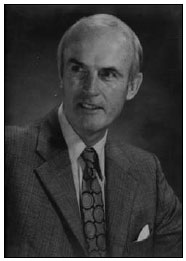Servicios Personalizados
Articulo
Indicadores
Links relacionados
-
 Citado por Google
Citado por Google -
 Similares en Google
Similares en Google
Compartir
SAMJ: South African Medical Journal
versión On-line ISSN 2078-5135
versión impresa ISSN 0256-9574
SAMJ, S. Afr. med. j. vol.101 no.2 Pretoria feb. 2011
FORUM
IN MEMORIAM
Edward Barry Adams (2 January 1918 -18 November 2010) (BSc (Oxon), MD (Wits), FRCP (Lond))

Barry Adams, Emeritus Professor of Medicine at the Nelson R Mandela School of Medicine, University of Natal, Durban, was a highly esteemed clinician and teacher. He is best remembered for instilling in his students an enduring recognition that acquisition of skills in eliciting and interpreting signs and symptoms was fundamental to good clinical practice. He began his postgraduate training at Oxford University, where the subject of his interest was aplastic anaemia. He was Foundation Professor of Medicine at the University of Natal from 1954 to 1978.
Although his declared interest was haematology, characterised by seminal publications on iron deficiency, megaloblastic and protein deficiency, he was equally at home exercising his clinical acumen and even co-authoring. Testimony to his considerable experience in the recognition and management of life-threatening disease prevalent in developing countries, was his involvement in research into the treatment of neonatal tetanus, a special unit being dedicated to its management within his own department.
An essential ingredient of his teaching was to question received wisdom and to offer new insights, both qualities being the ones he also instilled into members of his department who embarked on careers in medical research. Above all, he firmly believed that respect for colleagues and compassion for patients should underpin all aspects of the day-to-day practice of medicine. While he supported specialisation in medicine he was against the principle of the fragmentation of internal medicine into separate disciplines, as he believed that medicine should be practised and taught in a holistic manner. Behind the scenes his contribution during the apartheid era was to make a principled and unwavering stand against hostile and malignant forces threatening to undermine the high ideals that his department was determined to uphold. The medical school honoured him by naming the main lecture room in the Department of Medicine after him.
He was the author of three books, the first being A Companion to Clinical Medicine in the Tropic and Subtropics. This book describes his clinical experiences in medicine in his unit over 25 years. The second book was on tetanus, and the third was a biography of Dr Anthony Barker, a medical missionary who provided invaluable service in caring for Zulu patients in a rural hospital at Nqutu in Zululand.
Sybil, his wife of 67 years, was a kindred spirit and a much valued mother figure to generations of junior staff whom she made welcome in their home, first in Durban and later in Long Melford, Suffolk. Barry and Sybil were blessed with a happy family life, graced by their two sons and two daughters (one of the latter also pursued a medical career) who have maintained their links with Barry's former colleagues and students. The precipitating cause of death was a fracture of the femur.
Dr Oscar Jolobe
Professor Y K Seedat














